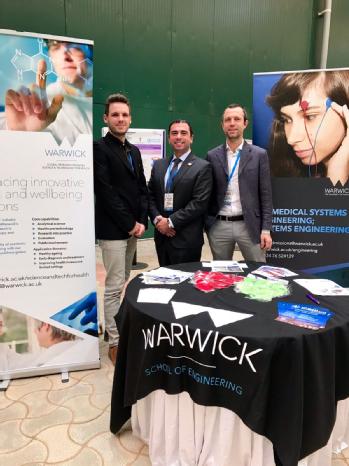Warwick Academics advise at WHO Global Health Forum on Medical Devices
- · Dr Leandro Pecchia and two of his PhD students Davide Piaggio and Carlo Federici attended the WHO Global Health Forum on Medical Devices in India last week
- · Dr Pecchia presented to the WHO the work he is doing supporting European Parliament and Africa Union in fostering the harmonization of their regulations on medical devices, in the best interest of both continents
- · Davide presented the Warwick work on how to use AI (artificial intelligence), smart phones and 3D printing to design medical devices in Africa.

Artificial Intelligence (AI), smartphones and 3d printing could be used to design medical devices for Africa and harmonizing African and European regulation on medical devices could benefit both communities – proposes Dr Leandro Pecchia from the School of Engineering at the University of Warwick at the 4th WHO Global Health Forum on Medical Devices.
Dr Leandro Pecchia from the School of Engineering at the University of Warwick was in India last week with PhD students’ Davide Piaggio and Carlo Federici, to attend the 4th WHO (World Health Organisation) Global Forum on Medical Devices.
Davide Piaggio, PhD student presented his contribution titled “Design, assessment and maintenance of medical devices resilience to Sub Saharan Africa (SSA) working conditions: the Warwick experience”, presenting all the ongoing projects in SSA.
Davide is developing an App that uses AI, enabling non-specialised healthcare staff to observe pupillary reflex, a technique used in emergency units to early detect brain trauma or cerebral death.
Apps like these can enable non-specialised doctors to perform fundamental examinations. The App is now undergoing rigorous clinical validation.
Carlo Federici, PhD participated in a panel titled ‘The use of real-world data and evidence for medical devices assessment.’ This panel discussed how real-world data can integrate the evidence generated by randomised trials capturing the real impact of medical devices, also in lower-income countries.
Dr Leandro Pecchia from the University of Warwick contributed to the forum by organising workshops and round tables. He comments:
“Modern medicine is growing so faster than ever before and the main enablers of this growth are medical devices, the main outcome of biomedical engineering. Our lab is particularly active in designing, assessment and management of medical devices, with a particular focus on how we can use emerging technologies such as 3D printing and Artificial Intelligence to face Global Health Challenges.”
Dr Pecchia is also coordinating a group of European Parliament Members determined in fostering the harmonization of regulations on medical devices and medical location among African Countries and Europe.
“Harmonising those regulation would be mutually beneficial. African patients would have a huge gain in terms of quality and safety. Europe would also facilitate the access of SMEs into the African market of medical devices, which is the fast growing in the world.
“This is crucial as in Europe 90 of the medical device manufacturers are SMEs, which struggle more than big multinationals from this lack of standardization. Personally, I believe that when we work on European-African cooperation, we cannot be led by philanthropic or humanitarian initiatives. We have to make an effort to demonstrate how this cooperation can be mutually beneficial. We are peer partners, not post-colonialists.”
ENDS
19 DECEMBER 2018
NOTES TO EDITORS
High-res images available at:
https://warwick.ac.uk/services/communications/medialibrary/images/december2018/l3.jpg
https://warwick.ac.uk/services/communications/medialibrary/images/december2018/l1.jpg
https://warwick.ac.uk/services/communications/medialibrary/images/december2018/l2.jpg
https://warwick.ac.uk/services/communications/medialibrary/images/december2018/l4.jpg
For further information please contact:
Alice Scott
Media Relations Manager – Science, University of Warwick
Tel: 02476 574 255 or 07920 531 221
E-mail: alice.j.scott@warwick.ac.uk
For further information please contact:
Alice Scott
Media Relations Manager – Science, University of Warwick
Tel: 02476 574 255 or 07920 531 221
E-mail: alice dot j dot scott at warwick dot ac dot uk
